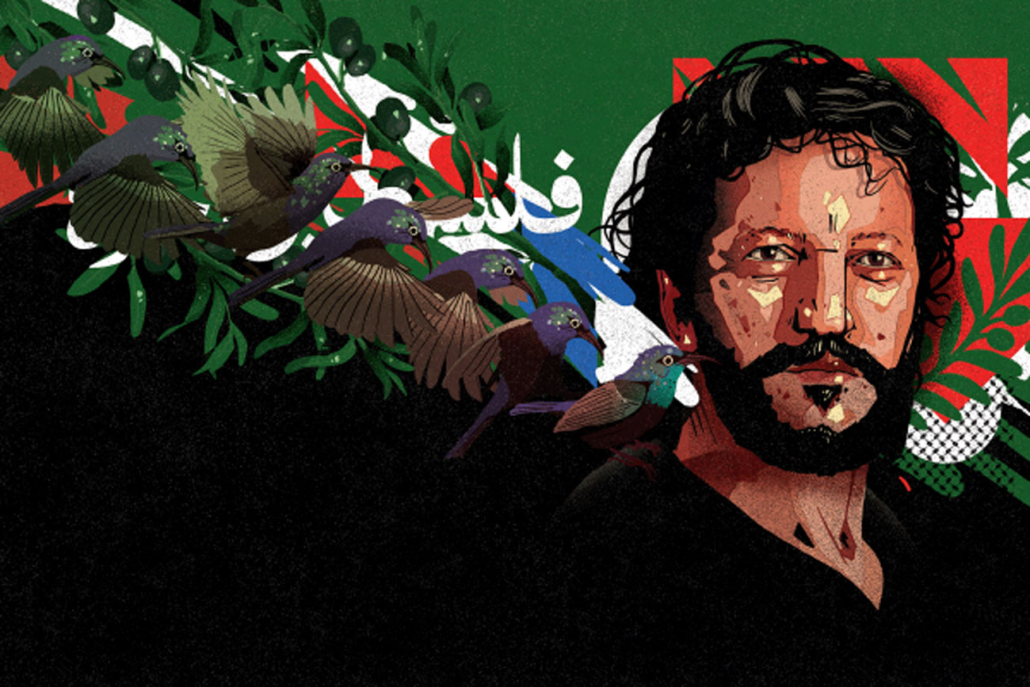Image: Ali Abu Awwad, illustration by Kael Abello, Sojourners, January 2024.
‘Let’s overturn these tables’
Andrew Collis
Lent 3, Year B
Exodus 20:1-17; Psalm 19; John 2:13-22
What does Jesus discern?
That the temple has been made a market, a place to buy and sell (consume) religion at the expense of those in real need of support, help and healing.
That collusion among the wealthy and entitled – and frequently frightened – leads to corruption – of institutions, individuals and values.
And Jesus discerns the moment to act.
Put positively, Jesus discerns that true religion entails free kindness (grace), accountability and timely action.
Whatever we mean by “sacrifice”, moreover, is transfigured in light of the gospel (and ancient prophetic tradition), which inspires translation/wisdom: words like grace, accountability and action … words like service, commitment, kenosis, donation, patience, forbearance, generosity, solidarity, compassion …
In this season of discernment, we too can learn the difference between coercion (fearful compliance) and liberation (joyful life in concert with others). We too can learn grace – to accept it and to offer it, to live/abide in it.
In the wake of Hamas’ brutal October 7 attack, as Israel’s retributory assault was gearing up, Ali Abu Awwad, an activist who lives in the West Bank, wrote: “Now more than ever, we all must refuse to use violence to justify more violence. We should not allow our pain to blind us to what is most needed: mutually guaranteed sovereignty, security and dignity for both Israelis and Palestinians.”
Awwad has been an advocate of nonviolent action for 20 years. The founder of Taghyeer (an Arabic word meaning “change”), he was recently awarded the Indira Gandhi Prize for Peace, Disarmament and Development for 2023.
I’ve been listening to Ali this past week, inspired/challenged by his prophetic zeal; his words about grace, accountability and action. I’ll cite just a few pertinent remarks today and save others for our Holy Thursday liturgy.
“The anger is there,” Awwad says. “It didn’t disappear. The challenge is not to be led by it. I’m angry, and I can be humiliated at any time, at any checkpoint. The question is, what do you do with it? What do you want from your reaction?
“[W]e have to create a place where we will no longer be prisoners of the anger that this situation creates every day. We must escape the prison of our narrative.
“The role of nonviolence is to speak to people’s despair – not to tell them they are right, but to show them a way out.
“[W]hen you open up your heart and you see the other, you begin to see the truth is complex – that my truth is true, but it’s a partial truth and there’s another truth that’s also partial and I have to learn to put them together and make the larger truth. I believe we can do that.
Awwad is not alone in recognising the humanity of all involved. For instance, some Israelis who suffered terrible loss in the Hamas attacks have been among the strongest proponents of peace.
Noy Katzman’s brother, Haim, was killed on October 7. In her eulogy, Noy called for the end of the killing of innocents. “I call on the government and all of us not to use our death and pain to cause death and pain of other people or other families,” Noy said. “I demand to stop the cycle of pain, and understand that the only way is freedom and equal rights.”
Israeli peace activist Maoz Inon, whose parents were killed by Hamas, implored Israel to stop its war on Gaza. “Revenge is not going to bring my parents back to life,” Inon wrote on Aljazeera.com. “It is not going to bring back other Israelis and Palestinians killed either. It is going to do the opposite. It is going to cause more casualties. It is going to bring more death. We must break the cycle.”
“The Jews are not my enemy; their fear is my enemy,” says Awwad. “We must help them to stop being so afraid – their whole history has terrified them – but I refuse to be a victim of Jewish fear anymore.
“A step toward freedom is to heal or to overcome that fear – or at least not to create more threats.
“Nonviolence is the art of practising your humanity, it is the art of being a human being. Peace is a place where we can live by accepting our differences and respecting each other’s rights.
“The nonviolence movement I’m leading is not about hummus and hugs. It’s not about good intentions. It’s not about sending our kids to each other’s summer camps. This is not the peace I want. Dialogue is not the goal. Dialogue is a tool for a bigger goal. We need to build a new political reality that can speak to both sides … We need to guarantee that these two identities can be practised in a fashion that no one has to pay the price of their dignity, land, rights or nationality.
“My advice to everyone is that when the world is dark, be a visitor to your pain – don’t be a resident of it. Go! You can grieve; you can cry. But don’t stay there, because the purpose of life is much more meaningful that tears and fear …”
We too can learn, perhaps slowly, fitfully, to live more simply, with passion and focus – to recognise purity of heart, in friends and strangers, insiders and outsiders.
And discern the moment to act.
Jesus cites Zechariah’s prophecy about a consuming zeal for God’s house and expresses his own zeal to reclaim the world as a place where human beings, as “children of God” (1:12), are at home in God’s house.
We too can learn grace – to accept it and to offer it, to live/abide in it. Amen.
Draws from interviews with Ray Suarez and Jim Rice, Sojourners, January 2024.




